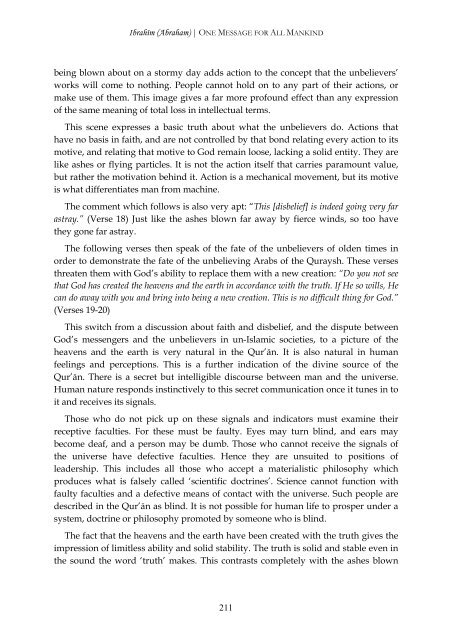Volume 10 Surah 12 - 15 - Enjoy Islam
Volume 10 Surah 12 - 15 - Enjoy Islam
Volume 10 Surah 12 - 15 - Enjoy Islam
Create successful ePaper yourself
Turn your PDF publications into a flip-book with our unique Google optimized e-Paper software.
Ibrahīm (Abraham) | ONE MESSAGE FOR ALL MANKIND<br />
being blown about on a stormy day adds action to the concept that the unbelievers’<br />
works will come to nothing. People cannot hold on to any part of their actions, or<br />
make use of them. This image gives a far more profound effect than any expression<br />
of the same meaning of total loss in intellectual terms.<br />
This scene expresses a basic truth about what the unbelievers do. Actions that<br />
have no basis in faith, and are not controlled by that bond relating every action to its<br />
motive, and relating that motive to God remain loose, lacking a solid entity. They are<br />
like ashes or flying particles. It is not the action itself that carries paramount value,<br />
but rather the motivation behind it. Action is a mechanical movement, but its motive<br />
is what differentiates man from machine.<br />
The comment which follows is also very apt: “This [disbelief] is indeed going very far<br />
astray.” (Verse 18) Just like the ashes blown far away by fierce winds, so too have<br />
they gone far astray.<br />
The following verses then speak of the fate of the unbelievers of olden times in<br />
order to demonstrate the fate of the unbelieving Arabs of the Quraysh. These verses<br />
threaten them with God’s ability to replace them with a new creation: “Do you not see<br />
that God has created the heavens and the earth in accordance with the truth. If He so wills, He<br />
can do away with you and bring into being a new creation. This is no difficult thing for God.”<br />
(Verses 19-20)<br />
This switch from a discussion about faith and disbelief, and the dispute between<br />
God’s messengers and the unbelievers in un-<strong>Islam</strong>ic societies, to a picture of the<br />
heavens and the earth is very natural in the Qur’ān. It is also natural in human<br />
feelings and perceptions. This is a further indication of the divine source of the<br />
Qur’ān. There is a secret but intelligible discourse between man and the universe.<br />
Human nature responds instinctively to this secret communication once it tunes in to<br />
it and receives its signals.<br />
Those who do not pick up on these signals and indicators must examine their<br />
receptive faculties. For these must be faulty. Eyes may turn blind, and ears may<br />
become deaf, and a person may be dumb. Those who cannot receive the signals of<br />
the universe have defective faculties. Hence they are unsuited to positions of<br />
leadership. This includes all those who accept a materialistic philosophy which<br />
produces what is falsely called ‘scientific doctrines’. Science cannot function with<br />
faulty faculties and a defective means of contact with the universe. Such people are<br />
described in the Qur’ān as blind. It is not possible for human life to prosper under a<br />
system, doctrine or philosophy promoted by someone who is blind.<br />
The fact that the heavens and the earth have been created with the truth gives the<br />
impression of limitless ability and solid stability. The truth is solid and stable even in<br />
the sound the word ‘truth’ makes. This contrasts completely with the ashes blown<br />
211

















